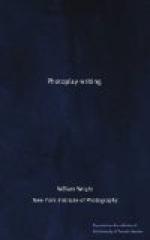CHAPTER XVIII
THE TREATMENT OF COMEDY
Let it be remembered that the lines of division between the several sorts of comedy are not sharply defined, for one often overlaps the other; nor is a rigid adherence to type insisted upon by either playwright or public—for example, on the regular stage we have farce-comedy, and other hybrids.
1. Types of Humorous Plays Distinguished
Comedy, strictly, is a lighter, more refined, type of humor than farce. It deals with those amusing situations which do, or may, happen every day, without the introduction of the extravagant and the unnatural. True comedy is distinctly probable. Its humor is the humor of reality, however laughable it may be. It may press humor to an extreme, but that extreme must never strain our credulity.
Farce is essentially extreme. It deals with the absurd, the ridiculous, not with the physically impossible. Though not in itself probable, all its actions proceed just as though the basis on which it is worked out were probable.
To illustrate both types, we may recall an extremely humorous comedy situation which was worked out by Miss May Irwin some years ago in “The Swell Miss Fitzwell.” One of the characters had conspired with a physician to deceive the former’s wife by pretending to break his leg. As a matter of fact he tumbles down stairs with an awful clatter and the leg is actually broken. The doctor comes in, according to the scheme, and, not knowing that the leg is broken, begins to twist it with fine professional vigor. The victim howls and protests that he is in agony, but the doctor merely whispers in a cheerful aside, “Keep it up, you are playing your part beautifully!” And so the play goes on.
All this might easily have happened in real life, and the audience is tickled—not to see a man apparently suffer, but at the humor of the biter being bit. The very incongruity is the foundation of the humor—incongruity, mingled with surprise.
But farce would not be content with twisting the leg, it would go to any absurd extreme imaginable. Suppose, for example, that the doctor’s twisting of the victim’s leg should so enrage him that he would leap upon the doctor and bite the torturer’s leg in the manner of a dog. The wife, coming in, might think that her husband had hydrophobia, and a whole train of farcical results might follow. We have all seen unnatural yet uproariously funny situations to which such a complication might lead in farce.
Burlesque takes a well-known and often a serious subject and hits off its salient points in an uproarious manner. One might burlesque “Hamlet” by causing a red-nosed Prince of Denmark to do a juggling act with “poor Yorick’s” skull.
Extravaganza deals with the unnatural and the impossible. The super-human antics of the acrobatic buffoons in Hanlon’s perennial “Superba,” and those of the Byrne Brothers in “Eight Bells,” are familiar examples.




